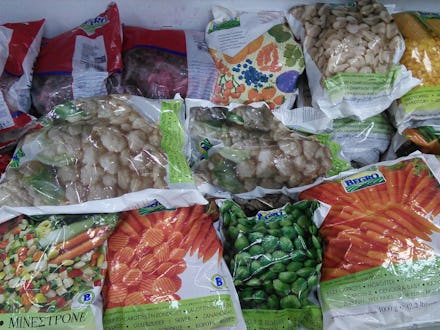How Do Frozen Vegetables Compare to Fresh When It Comes to Nutrients?

Conventional wisdom says fresh vegetables are more nutritious. On the other hand, frozen vegetables are more convenient for the habitually busy individual who doesn't have time to roam the farmer's market every weekend. A bag or two of frozen vegetables in the freezer is also good to have in case you need a makeshift icepack. But as they begin to develop yet another layer of freezer burn in the back of your fridge, you might wonder whether they are worth eating anymore, in terms of nutrition. You might even be wondering the same about freshly purchased bags of frozen vegetables and how they stack against their farm-fresh counterparts, but it really depends on which vegetables you're grabbing in the frozen food aisle.
Read more: How to Eat Healthy When You're Broke AF
According to Livestrong, "Vegetables are more likely to retain their nutritional value if they're frozen immediately after being harvested." While the minerals, carbohydrates and fiber remain unaltered during the freezing process, ACE Fitness notes that water-soluble vitamins can be lost during the processing that precedes the freezing, mainly the blanching of the vegetables. Vitamin C, for example, is very sensitive to heat and light, and is susceptible to oxidation.
With that said, even fresh vegetables are susceptible to losing nutrients: "Between pest-controlling sprays, transportation, handling and plain ol' time, fresh produce at the store might have lost roughly half its original amount of nutrients," Greatist's Marcy Franklin notes. This is mostly due to enzymes like trypsin and chymotrypsin, which fresh vegetables produce after harvest that causes loss in flavor and nutrition. Frozen vegetables, on the other hand, can "deactivate" the enzymes and preserve the nutrients.
Franklin suggests purchasing vegetables high in water-soluble vitamins like B and C fresh. Examples include cabbage and fruits. Conversely, vegetables high in fat-soluble vitamins, like A and E, as well as carotenoids, are more durable during processing and can be purchased frozen with no significant loss in nutrients. Examples of these stable vegetables include broccoli, carrots and leafy greens like spinach.